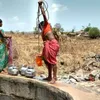Tamil Nadu farmers, youth volunteers repurpose borewells for rainwater harvesting
With abandoned borewells turning hazardous for children, Thanjavur and Pudkottai districts’ farmers are converting them into rainwater harvesting structures.
This Diwali, the people of Tamil Nadu were glued in great anxiety to their televisions, following the rescue of two-year-old Sujith Wilson from an abandoned borewell near his house in Tiruchirapalli district. Unfortunately, despite 82 hours of sustained rescue efforts, he could not be saved.
The toddler’s death was a wake-up call on the need to regulate abandoned borewells in Tamil Nadu. In the past 15 years, at least 10 children have lost their lives in the southern state after getting trapped in unused borewells.
To avoid such incidents in future, the Tamil Nadu Water Supply and Drainage Board (TWAD) has passed orders to convert abandoned dry open wells and borewells across the state into rainwater harvesting (RWH) structures on a war footing. The state’s IT department has also proposed a hackathon to find a working model to rescue children stuck in borewells or tunnels.

Volunteers convert defunct bore wells with dual purpose of turning them into rainwater harvesting structures.
Photo Credit: Aadhavan
Meanwhile, the Kadaimadai Area Integrated Farmer’s Association (KAIFA)—an association of farmers in Thanjavur and Pudukottai districts—is converting defunct borewells into RWH structures, which will serve the dual purpose of groundwater recharge and closure of the potential deathtraps.
Digging deep to pitch in
At Peravurani in Thanjavur district, KAIFA’s core members are busy arranging the logistics for the conversion work. When KAIFA announced through their social media page that they would voluntarily take up work to convert individual and community borewells that had become defunct, it received over 60 requests within a span of three days.
“We have already surveyed 40 wells and plan to convert at least 50 abandoned borewells immediately, at the rate of three to five per day,” farmer Karthikeyan Veluswamy (40), a senior member of KAIFA, told VillageSquare.in.

Rainwater being collected for harvesting.
Image Credit: Shutterstock
The association’s first project was in Thennankudi village in Peravurani taluk. To convert the community borewell, the volunteers made arrangements for rainwater from the roof of a nearby e-seva centre to flow into the borewell. Additionally, overflow from a nearby water tank was also diverted into the borewell.
The process
The volunteers dig a three-foot-deep pit around the borewell to expose the PVC pipeline. They then drill small holes in the pipe, and precast cement rings are lowered into the pit. The rings are finally sealed together with cement.
For filtration, the pit is filled with gravel measuring 40 mm and 20 mm in size to a depth of 15 cm and 30 cm, respectively. Rainwater that gets collected in the pit slowly percolates into the modified borewell structure through the gravel and the holes in the pipe. The pipe is closed with a sturdy cap and the pit is sealed with a cement lid.

Holes drilled in pipes extending from the borewell help water collected in the pit percolate and recharge groundwater.
Photo Credit: Aadhavan
“As of now, we have kept the process fairly simple. We might get better ideas and improvise as we progress,” said Nimal Raghavan, a member of KAIFA, taking pictures to document the sequence of their work.
A low- cost solution
The second project the team took up was on farmer Velusamy’s individual borewell in Kalathur, with a proposal to collect water from the rooftop of his house in the 300-feet deep borewell.
Volunteers convert these defunct borewells into an RWH structure in less than five hours at a nominal cost of about Rs. 4,500.
“Our association bears the expenditure for this conversion; interested persons can contribute for individual borewell projects. We have a very simple and transparent accounting system, where all the contributors can track the projects through our social media page,” added Nimal.
Precautions necessary
Chennai-based rainwater harvesting expert Sekhar Raghavan is happy to see that the common man has finally realised the need to invest in rainwater harvesting. However, he mentioned that necessary precautions needed to be taken in carrying out these projects.

Cement rings retain earth of the pit around the repurposed bore wells, when rainwater gets collected in the pit.
Photo Credit: Aadhavan
He noted,
“Water from rooftops is fairly clean to use, and paved area (like courtyard) runoffs can also be used. As for unpaved area runoff, as in the case of lawns, it would be better to build ponds around the borewell to collect the water and let it percolate slowly."
He suggested a filtration system to avoid clogging. He stressed the need to prevent sewage water and other pollutants from entering the system.
“Recently, an industry complex near Erode disposed their effluents into a borewell, which is an offence. It could pollute the entire aquifer,” he explained.
Guidance and support all the way
For its part, TWAD has stated that the public or any NGO can seek the board’s help to close or repurpose abandoned borewells by reaching out through its website or its twitter handle, @twadboard. One can also visit TWAD board’s regional offices in person for guidance.
Coordinating borewell conversion projects across Peravurani, Pattukottai, Alangudi, and Aranthangi taluks, Naveen Anandan, Founder, KAIFA, told VillageSquare.in, “Yes, local people should take this forward in their respective areas.”
Anandan is overwhelmed by the calls he gets from across the state.
“Our team can handle projects in these four taluks; it would be impractical for us to take on projects outside this zone,” he said, adding, “However, we can offer guidance to the others.”
Volunteers in Thanjavur district pointed out a challenge in sourcing caps to close the borewells due to the increased demand.
Community comes together
The work on these conversion projects has been made possible through the support of farmers and youth volunteers like Hariharan (20). A marine engineering student, Hariharan has no qualms about getting his hands dirty for his hometown. He and his friends have dug pits, drilled holes, and done all the necessary work to see gushing excess water flow into the borewell.
“It gives immense satisfaction to see our work bear fruit. I know people think it’s not cool to take up such manual work, but if we don’t take care of our land, who will?” said Hariharan. Sekhar Raghavan, another volunteer, affirmed that rainwater harvesting was a community initiative.
Stating that when more RWH structures come up in a village, the local aquifer would be recharged to benefit the entire area, he said,
“On the other hand, if an individual farmer saves 1,000 litres of water through his borewell, he cannot assume that he will get the same amount of water back.”
Two months ago, KAIFA had requested the local administration for permission to recharge defunct borewells, but there was no response. It so happened that it took the sad demise of Sujith to stir the state into action. Having been present during the rescue efforts, these volunteers are converting the borewells in their community with a purpose.
(Edited by Athirupa Geetha Manichandar)










